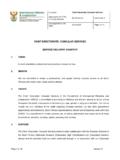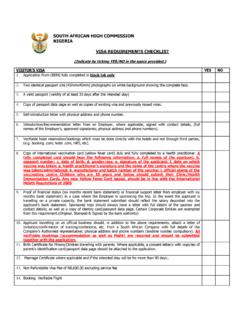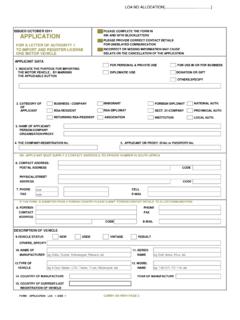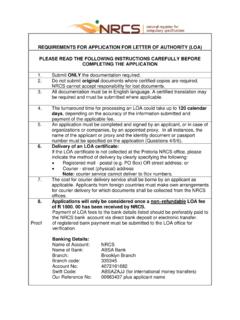Transcription of CONSTITUTIONAL COURT OF SOUTH AFRICA CCT …
1 CONSTITUTIONAL COURT OF SOUTH AFRICA CCT 17/01 KHALFAN KHAMIS MOHAMED First Applicant ABDURAHMAN DALVIE Second Applicant and PRESIDENT OF THE republic OF SOUTH AFRICA AND SIX OTHERS Respondents and THE SOCIETY FOR THE ABOLITION OF THE DEATH PENALTY IN SOUTH AFRICA THE HUMAN RIGHTS COMMITTEE TRUST Amici Curiae Heard on : 10 May 2001 Decided on : 28 May 2001 JUDGMENT THE COURT : [1] The first applicant before this COURT , Mr Khalfan Khamis Mohamed (AMohamed@), is currently standing trial on a number of capital charges in a federal COURT in New York.
2 He alleges that the relief sought in the proceedings in this COURT could have a bearing on the criminal trial which started some months ago. For that reason the preliminary steps for a hearing in this COURT THE COURT 2 were foreshortened and, with the cooperation of counsel for the parties, set-down was It is necessary to describe the nature of each of the two cases and to explain their interrelationship. [2] The case before this COURT is an urgent application for leave to appeal against a judgment in the Cape of Good Hope High In that Court3 the applicants sought declaratory and mandatory relief against the government4 arising out of Mohamed=s arrest in Cape Town on 5 October 1999, his subsequent detention and interrogation there by SOUTH African immigration 1 Rule 11(1) of the CONSTITUTIONAL COURT Rules provides that in urgent matters the President of the COURT may dispense with the forms provided in the rules and give directions as to time, manner and procedure of disposal of the matter.
3 2 Per Blignault J, Hlophe JP concurring, delivered on 20 April 2001. 3 The initial application, launched on 14 November 2000, was aimed at obtaining sight of the official SOUTH African documents relating to Mohamed=s case and on 15 December 2000 Conradie J issued an interlocutory order for the production by the respondents of Aall information in their possession in respect of which lawful privilege may not be A bundle of documents was produced and a subsequent order by Hoffman AJ led to extracts of another document being delivered. The notice of motion was then amended to claim the substantive relief that remains in issue before this COURT . 4 The respondents cited are the President as head of the Executive, the Minister of Justice and CONSTITUTIONAL Development, the Minister of Home Affairs, the Minister of Safety and Security, the Minister of Foreign Affairs, the National Director of Public Prosecutions and the Chief Immigration Officer, Cape Town.
4 THE COURT 3 officers and his handing over to agents of the United States Federal Bureau of Investigation (Athe FBI@) for interrogation and removal two days later to New York, there to stand trial. [3] The argument advanced on behalf of the respective parties will be analysed in detail later. Suffice it to say by way of introduction that the main contention on behalf of the applicants (supported by the amici curiae5) was that Mohamed=s arrest, detention, and handing over by the SOUTH African authorities to the FBI agents and his removal by them to the United States were part and parcel of a disguised extradition in breach of the law.
5 More particularly the SOUTH African authorities were said to have breached the provisions of the Aliens Control Act6 (Athe Act@) and the regulations published Even more pertinently, Mohamed=s 5 The Society for the Abolition of the Death Penalty in SOUTH AFRICA and the Human Rights Committee Trust. 6 Act 96 of 1991. 7 The Aliens Control Regulations published under Government Notice R999 (Government Gazette 17254) of 28 June 1996. THE COURT 4 CONSTITUTIONAL right to life, to dignity and not to be subjected to cruel, inhuman or degrading punishment8 had allegedly been infringed.
6 8 The relevant provisions of the Bill of Rights read as follows: 10 Human dignity Everyone has inherent dignity and the right to have their dignity respected and protected. 11 Life Everyone has the right to life. 12 Freedom and security of the person (1) Everyone has the right to freedom and security of the person, which includes the right C (a) not to be deprived of freedom arbitrarily or without just cause; (b) not to be detained without trial; (c) to be free from all forms of violence from either public or private sources; (d) not to be tortured in any way; and (e) not to be treated or punished in a cruel, inhuman or degrading way. (2) .. THE COURT 5 [4] The factual substratum of the case for the applicants was gleaned from documents that had been made available to their legal representatives pursuant to two interlocutory orders on the government for their disclosure.
7 The thrust of the consequential relief the applicants unsuccessfully sought in the High COURT and pursued in this COURT was a declaration to the effect thatC (i) the arrest, detention, interrogation and handing over of Mohamed to the FBI agents were unlawful and unconstitutional; and (ii) the respondents breached Mohamed=s CONSTITUTIONAL rights by handing him over to the custody of the United States without obtaining an assurance from the United States government that it would not impose or carry out the death penalty on him if convicted. [5] The mandatory relief sought pursuant to this declaration was an order A[d]irecting the Government of the republic of SOUTH AFRICA to submit a written request through diplomatic channels to the Government of the United States of America, that the death penalty not be sought, imposed nor carried out upon [Mohamed]@ should he be convicted in the criminal trial.
8 [6] The crux of the government=s contentions, which carried the day in the COURT below, was that Mohamed was an illegal immigrant whom the immigration authorities had properly decided to deport and whose deportation was mandated by the Act. Such deviations as there might have been from the literal prescripts of the Act or the regulations were of no legal consequence. Nor did the collaboration between the SOUTH African officials and the FBI agents whereby Mohamed was eventually removed to the United States make any difference to his status or his liability to deportation. Moreover, so the COURT held, on the evidence of the immigration officials, which THE COURT 6 could not be rejected in motion proceedings, Mohamed had been duly apprised of his rights and had freely elected to accompany the FBI officers without delay to the United States, there to stand trial with his comrades.
9 Finally, so the government contended and the COURT found, a COURT had no power to issue the mandamus sought, which would in any event have no efficacy. On 20 April 2001 the High COURT delivered its judgment, comprehensively dismissing the contentions advanced on behalf of the applicants and refusing the relief they had sought. [7] That is when the applicants approached this COURT as a matter of urgency, asking for condonation for non-compliance with the ordinary procedures for appeals to this COURT and for leave to bring an appeal directly On the face of it there was manifest urgency and, with the active cooperation of all concerned, the matter was ripe for hearing within three weeks of delivery of the judgment below. The COURT is grateful to all who made this possible. With this description of the nature of and backdrop to the proceedings in this COURT , we turn to outline the other case which is currently under way in New York.
10 9 Ordinarily, under rule 18(6) of the rules of this COURT , the COURT of first instance should be asked to furnish a certificate as to, among other things, the prospects of success on appeal and whether it is in the interests of justice for the matter to be brought directly to this COURT . Rule 31 of the rules affords this COURT a general discretion, Aon sufficient cause shown@ to condone non-compliance with any of the rules and rule 11(1), as pointed out in n 1 above, makes provision for directions to be given in urgent cases. THE COURT 7 [8] That case, a criminal trial, arises from events that took place on 7 August 1998 in Nairobi and Dar es Salaam.


















